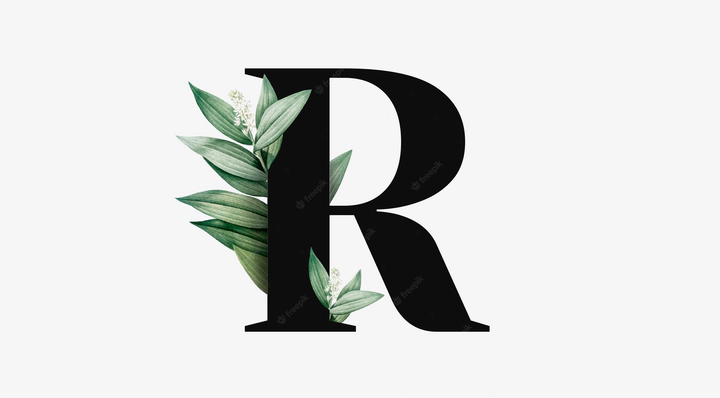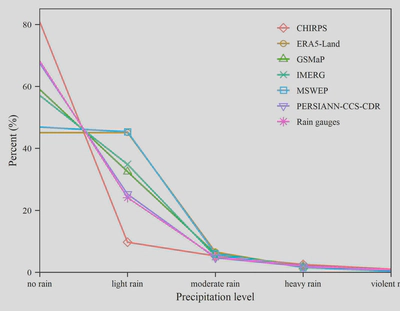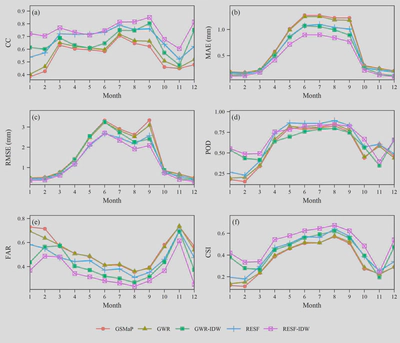R语言折线图绘制模板

在熟悉绘图函数及其参数设置后,形成一套通用模板有助于提高制图效率。本文展示了几种基于R语言ggplot2包的折线图绘制代码。
一、单一折线图
## library
library(ggplot2)
## read data
data <- read.csv("fig1.csv")
data$Level <- factor(data$Level,
levels = c('no rain',
'light rain',
'moderate rain',
'heavy rain',
'violent rain'))
data2 <- data[data$Level %in% c("light rain",
"moderate rain",
"heavy rain"),]
shape_list7 <- c(5,1,2,4,0,6,8)
## plot
ggplot(data = data,
mapping = aes(x = Level,
y = Percent,
group = Product,
color = Product))+
geom_line(linewidth = 0.5) +
geom_point(data = data2,
aes(shape = Product)) +
labs(x = "Precipitation level",
y = "Percent (%)")+
scale_x_discrete(expand = c(0.001,0))+
scale_y_continuous(limits = c(0,85),
expand = c(0.0015,0))+
scale_shape_manual(values=shape_list7) +
theme_bw() +
theme(text = element_text(family="serif",
size = 7),
panel.grid = element_blank(),
panel.border = element_rect(linewidth = 0.5),
legend.position = c(0.82, 0.76),
legend.title = element_blank(),
legend.box.spacing = unit(0, "cm"),
legend.key.size = unit(10, "pt"),
legend.background = element_blank(),
axis.ticks = element_line(linewidth = 0.3),
axis.line = element_blank(),
axis.text = element_text(color = "black"))
## save
ggsave("fig1.jpg",
width = 9,
height = 7,
units = "cm",
dpi = 600)

二、多折线图
## library
library(ggplot2)
library(ggpubr)
## read data
re <- read.csv("fig2.csv")
re$Station <- as.character(re$Station)
## plotfun
plotfun <- function(data,
ylab,
label,
yexpand=0.05){
ggplot(data = data,
mapping = aes(x = Month,
y = Values,
color = Method,
shape = Method))+
geom_line()+
geom_point()+
scale_y_continuous(expand = c(yexpand,0,0.1,0))+
scale_x_continuous(expand = c(0.001,0),
n.breaks = 12)+
labs(x = "Month", y = ylab)+
annotate("text",
x = 1.4,
y = max(data$Values)*1.05,
label = label,
family="serif", size = 2.5) +
theme_bw() +
theme(text=element_text(family="serif",
size = 7),
panel.grid = element_blank(),
panel.border = element_rect(linewidth = 0.5),
legend.title = element_blank(),
legend.key = element_rect(fill = "transparent"),
axis.ticks.x = element_line(linewidth = 0.28),
axis.ticks.y = element_line(linewidth = 0.3),
axis.text = element_text(color = "black"))
}
## plot
a <- plotfun(re[re$Metric=="CC",], "CC", "(a)")
b <- plotfun(re[re$Metric=="MAE",], "MAE (mm)", "(b)")
c <- plotfun(re[re$Metric=="RMSE",], "RMSE (mm)", "(c)")
d <- plotfun(re[re$Metric=="POD",], "POD", "(d)")
e <- plotfun(re[re$Metric=="FAR",], "FAR", "(e)")
f <- plotfun(re[re$Metric=="CSI",], "CSI", "(f)")
ggarrange(a,b,c,d,e,f,
ncol = 2,
nrow = 3,
align = "hv",
common.legend = T,
legend = "bottom")
## save
ggsave("fig2.jpg",
width = 14,
height = 12,
units = "cm",
dpi = 600)
